WTO hails successful Abu Dhabi meeting but says work cut out for countries
04 March, 2024

World Trade Organisation leaders have voiced satisfaction with the 13th Ministerial Conference held in Abu Dhabi, despite tough discussions and the inability to reach agreements on certain issues.
The 13th WTO Ministerial Conference in Abu Dhabi resulted in positive outcomes for developing countries, addressing issues like e-commerce tariffs and fisheries subsidies. Despite challenges, it fostered constructive dialogue among over 160 member countries, highlighting efforts to enhance global trade transparency and inclusivity, while also marking the accession of Comoros and Timor-Leste after eight years.
The biennial meeting resulted in “very good decisions” amid the UAE's successful organisation of the event, Ngozi Okonjo-Iweala, the WTO's director general, told state news agency Wam.
“I see it very positively, we were able to close some negotiating files. We've got some very good results for developing countries and least-developed. Yes, we were not able to close some other files, but we'll continue working on them in Geneva,” she said, referring to the WTO's headquarters.
Ms Okonjo-Iweala praised conference chairman Dr Thani Al Zeyoudi, the UAE Minister of State for Foreign Trade.
“We worked hard. It was tough, but we delivered thanks to his chairmanship,” she said. Dr Al Zeyoudi said that "while not everything that delegations set out to accomplish could be delivered, the commitment shown will further strengthen the multilateral trading system". Any sticking points are expected to be addressed and completed at the next conference in 2026, said Manoa Kamikamica, Fiji's Deputy Prime Minister.
“The final decisions were very positive and the meetings were fruitful and successful. We've made positive progress on some files after days of negotiations and discussions between the WTO member states,” he added
Ministers had focused on reaching agreements on some of the key issues affecting global trade, including the reform of the WTO’s dispute resolution system, extension of a ban on e-commerce tariffs and reduced subsidies on fisheries and agriculture.
“The fisheries file was not fully resolved despite its importance for the Pacific region, but we are excited to complete this file within the next two years,” said Mr Kamikamica, who is also the South Pacific country's Minister of Trade.
WTO member countries agreed to extend the moratorium on e-commerce tariffs for another two years amid efforts to support the growth of trade globally.
They also agreed to speed up discussions on dispute settlement reforms at the trade body, according to a WTO document released late on Friday.
Delegates from more than 160 member countries took part in the conference.
It was supposed to end on Thursday but was extended to Friday to give members more time to iron out differences on matters affecting global trade.
Despite the outstanding issues, the conference was able to “facilitate constructive dialogue” that will be key to shaping the future of global trade, said Qais bin Mohammed, Oman's Minister of Commerce, Industry and Investment Promotion.
The meeting “witnessed a significant momentum in discussions and dialogues … to shed light on several important issues that support and stimulate international trade, especially in light of the geopolitical tensions the world is witnessing”, he said.
Global trade has been severely disrupted in the past two years, amid high inflation and interest rates, the Russia-Ukraine and Israel-Gaza wars, and, most recently, the Houthi attacks on shipping vessels in the vital Red Sea trading route.
The UAE's success in hosting the conference “confirms its efforts to support the development of the WTO in light of the changes the global economy is witnessing”, said Mohamed Al Huwaij, Libya's Minister of Trade and Economy.
This comes at a time "when the world is witnessing geopolitical tensions that affect supply chains, which in turn impact the movement of global trade”, he added.
The conference also provided an opportunity for all member states to “debate fairer and more transparent trade measures and procedures”, said Ryad Mezzour, Morocco's Minister of Industry and Trade.
The accession of Comoros and Timor-Leste after eight years is “an indication of the organisation's attractiveness and importance”, and the event presented “ways of co-operation to reach a more efficient, sustainable and inclusive trading system”, he said.
Source: www.thenationalnews.com
